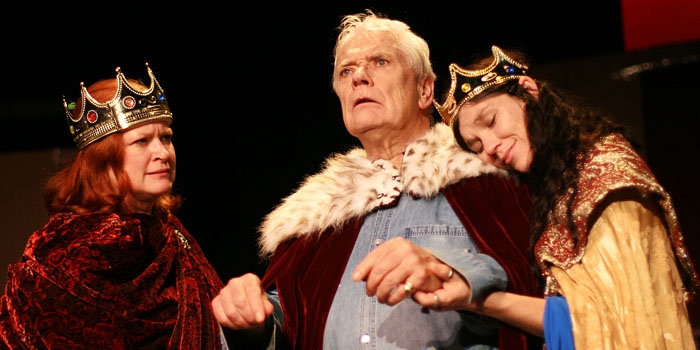Play 'Exit the King' Leaves Lasting Impression
 /
Checkmate. Norman Macleod (center), Beth Chastain (left) and Satya Soleil Starr (right) star in 'Exit the King.'
|
Early
on in "Exit the King," King Berenger is informed that he will die in
exactly an hour and 30 minutes. The declaration is but a formality. His
body is failing him. His kingdom is going to pieces around him. The
last remaining ministers of his country are disposing of themselves in
the nearest river stream. Once able to bend others and all the forces
of nature to his will, the king is now unable to even lever himself up
to his feet without collapsing. Presented by the Actors Ensemble of
Berkeley and directed by Jerome Solberg, "Exit the King" is a blackly
comedic farce and a revealingly philosophical acceleration toward
death.
The play is third in Eugene Ionesco's Berenger Cycle, named
for its anxious protagonist; previous iterations include "The Killer"
and "Rhinoceros," absurdist dramas where Berenger is also featured.
Ionesco is commonly aligned with Samuel Beckett and the Theater of the
Absurd in that both explore themes of isolation and humanity in its
ground state of excruciating emotional quarantine. In many ways "Exit
the King" is one of Ionesco's most accessible works. It happens in
chronological order. Dialogue is understandable. Its characters don't
turn into a herd of rhinoceros or detonate in a fit of homicidal
lunacy.
Certainly, "Exit the King" exhibits the Ionescoian hallmarks
of fourth-wall violations, abrupt surrealism and bouts of wild
caricature. The guard bellows a lot of nonsense according to the wishes
of the royalty, with hilarious comedic timing. Preserved from its
original French, the play's loopy wordplay makes for the fine-detail
entertainment one expects from an Ionesco production. Haughty Queen
Marguerite, the cast-off second-favorite, sweeps about with narrowed
eyes and cynical grandeur, remarking on the play's length and passage
of real time: "You will die at the end of this show," she repeatedly
tells her husband.
One serious weakness is the variability in acting quality.
Norman Macleod's King Berenger is a marvelous act to behold. Once
unassailable, now a knock-kneed wreck, the king is nearly crippled and
undeniably pathetic-but still a commanding stage presence for all his
chest-puffery and attacks of slack-mouthed senility. His anguish, while
sometimes comically exaggerated, is really what anchors us in sympathy
for his struggles. Beth Chastain, as Queen Marguerite, fills out her
role with a spine of imperial steel. But a simpering Queen Marie grates
on the nerves-one imagines that an evocation of childish innocence and
belief in the power of love was not meant to be this annoying-and the
Doctor's stentorian oration is too big for his role and the spartan
confines of the stage.
Still, the depth and humor of the play's language and its
rich veins of metaphysical conundrum and biblical allusion make the
play an absorbing work to puzzle through even after the curtains have
dropped. The work is timely too, with Obama's recent inauguration and
the ushering out of the long-installed Bush regime. Macleod and
Chastain fill their roles with force and fury, and several stirring
soliloquies serve as both indicators of Berenger's enormous ego-last
sighted sinking the Titanic-and more largely as commentary on the
ephemeral nature of life. Through Berenger, we understand, fear and
begin to come to terms with the agonizing solitude of man in facing
down death alone. The ending, forecasted in the title, becomes a
meditation on the idea that we can all "learn" how to die- that
mortality can be at least shared and mourned together, the exit eased
by those around you.
Article Link: http://www.dailycal.org/article/104028